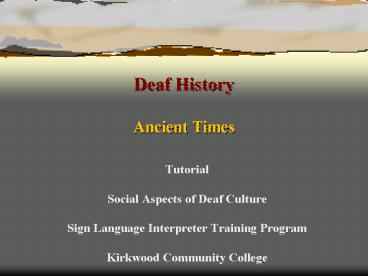Deaf History Ancient Times - PowerPoint PPT Presentation
1 / 16
Title:
Deaf History Ancient Times
Description:
... indigenous to North America with specific grammatical and linguistic properties. ... breath entered the simple clay, taught that bodily impediments came from God. ... – PowerPoint PPT presentation
Number of Views:155
Avg rating:3.0/5.0
Title: Deaf History Ancient Times
1
Deaf HistoryAncient Times
- TutorialSocial Aspects of Deaf CultureSign
Language Interpreter Training ProgramKirkwood
Community College
2
- Objectives for Deaf History Unit
- Identify important events and people and
ideologies in the development of Oral education
for the deaf given information contained in the
tutorial. - Identify important events and people and
ideologies in the development of manual education
for the Deaf given information contained in the
tutorial.
3
- Vocabulary
- Manualism - education of the deaf using sign
language, and the manual alphabet - 2. Oralism - education of the deaf using speech
and lip-reading
4
- Deaf - a cultural and linguistic identity
acquired by many deaf person which is viewed as a
desirable and valued state-of-being. - 4. deaf a term used to describe the inability
to hear normal speech patterns and general sounds
within the environment.
5
5. Residential Institution - state school for
the deaf, state funded schools serving a regional
or statewide population of Deaf and
hard-of-hearing children. 6. Language - a
systematic form of communication which enables
its users to talk about anything, anywhere,
according to a system of grammatical rules which
are learned and internalized.
6
- American Sign Language - a natural,
visual-gestural language which is indigenous to
North America with specific grammatical and
linguistic properties. - Congenital Deafness - deafness which is present
at birth.
7
- Deaf Community a community made up of Deaf and
non-deaf people who share the goal of furthering
the goals and interests of Deaf people and work
collaboratively to that end. - Hearing a term used within the Deaf Community
to refer to non-deaf people who are basically
misinformed or uninformed about the Deaf
experience.
8
- Pre-lingual deafness - the significant loss of
hearing which occurs after birth, but prior to
the time an infant acquires oral/aural language
competence. This is usually considered to be
before the age of three. - Post-lingual deafness - the significant loss of
hearing which occurs during adolescence, after
oral/aural language competence has been acquired.
9
Ancient History
All text is taken from the Encyclopedia of
Deafness, Gallaudet Press
10
- The people seemingly most interested in
deafness in ancient times were philosophers, law
givers, and physicians. Their accounts reveal
that the ancient world often recognized a
connection between deafness and speechlessness.
Some thought deafness indicated a curse from God.
Others believed that the congenitally deaf
person, invariably lacking intelligible speech,
also lacked a soul and perhaps all ability to
reason. Two main beliefs emerged - speech is a physiological function, so
speechlessness is a medical problem or, - speech is a function of a separate soul, so
speechlessness requires a philosophical or
theological remedy
11
Moses
12
From classical times until the Enlightenment,
speechlessness and varying degrees of speech
problems were seen more as spiritual than
physical ailments as theologians and physicians
wrestled with the relationship of the body and
soul. Ancient Hebrew tradition, which recognized
each human as an entity, a unity created when
God's breath entered the simple clay, taught that
bodily impediments came from God.
13
In Exodus 410, Moses complains to God that he is
"slow and hesitant of speech," and so should not
be charged with liberating the Hebrews from
Egypt. God replies, "Who is it that gives man
speech? Who makes him dumb or deaf? Is it not
I, the Lord? Go now, I will help your
speech..." In Leviticus 1914, the law states,
"You shall not treat the deaf with contempt."
The Old testament foretold by Isaiah that deaf
people would hear and dumb persons speak.
Centuries later, Jesus as the personification of
the Messiah was to heal those deaf and dumb.
14
Questions1. Where did the main ideas
concerning the deaf come from according to this
time in history?2. What were the main prevalent
thoughts about the deaf disability or culture?
15
Answers
16
- From philosophers, law givers, and physicians.
- Prevalent thoughts about deafness were that it
was a disability.































